Russell D. Moore's Blog, page 8
December 20, 2013
Best Books I’ve Read This Year
 Here’s my end-of-the-year roundup of the best books I read this year. They are not all 2013 books (though most of them are), but they’re all books I found especially meaningful this year. They are in no particular order (other than the random pile sitting in front of me).
Here’s my end-of-the-year roundup of the best books I read this year. They are not all 2013 books (though most of them are), but they’re all books I found especially meaningful this year. They are in no particular order (other than the random pile sitting in front of me).
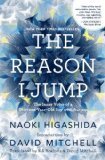
 1. The Reason Why I Jump: The Inner Vice of a Thirteen-Year-Old Boy with Autism, Naoki Higashida
1. The Reason Why I Jump: The Inner Vice of a Thirteen-Year-Old Boy with Autism, Naoki Higashida
Those of us who love someone on the autism spectrum know that sometimes we wonder, “Why do you do that?” This book drove me to tears dozens of times, as this remarkable, autistic young man answers questions such as “Why don’t you make eye contact when you’re talking?” and “Why do you ask the same questions over and over?”
Beyond the helpful insider’s glance from the autistic point-of-view, there’s a larger vision here. “Us kids with autism would like you to watch out for us, meaning, ‘Please never give up on us,’” he writes. “When we sense you’ve given up on us, it makes us feel miserable. So please keep helping us, through to the end.”
Man.
Don’t we all need that? This book made me resolve, all the more, not to give up on someone, through to the end.

 2. Flannery O’ Connor: Writing a Theology of Disabled Humanity, Timothy J. Basselin
2. Flannery O’ Connor: Writing a Theology of Disabled Humanity, Timothy J. Basselin
I normally read quickly. This book took a long time, because I would stop and ponder. The author contends that we have a hard time with disability because we have a hard time with limitation, especially in an American Dream culture that says our possibilities are endless. He argues that O’Connor’s limitations, lupus and the resulting need to stay at home in Georgia, made her who she was. This book made me think quite differently about suffering, about God’s mercy, about those we see as “broken” or “odd.”
This book is the perfect antidote to the prosperity gospel, both the gauche ones we see on TV and the subtler shades of Baalism we find in our own hearts.

 3. Recovering Classic Evangelicalism: Applying the Wisdom and Vision of Carl F. H. Henry, Gregory Alan Thornbury
3. Recovering Classic Evangelicalism: Applying the Wisdom and Vision of Carl F. H. Henry, Gregory Alan Thornbury
How could I not love this book? The subject is a man I came to know in his elderly years, and whose theology, especially in his tract The Uneasy Conscience of Modern Fundamentalism changed my whole life. The author is my friend since the days we were neighbors in Southern Seminary housing and fellow research assistants in the basement of the President’s home. But even if I didn’t know anything about either, this book is right on point. Thornbury shows that Henry’s biblical orthodoxy matched with philosophical savvy and cultural mission wasn’t a fluke of the last century, but is needed more than ever.
And it’s written with classic Thornbury clarity, wit, intellect, and fun. Thank God the King’s College was smart enough to elect him president. I wish Dr. Henry could have lived to see it, and to read this fine book.

 4. Merle Haggard: The Running Kind, David Cantwell
4. Merle Haggard: The Running Kind, David Cantwell
Y’all know I pledge allegiance to the Hag. But this book is important and worthy, even apart from the greatness of Merle’s music. The book is a sophisticated cultural history, tracing Haggard’s experience as the son of “Okie” migrants to California, as despised and stereotyped as other immigrants were in other times and places. It also traces his Forrest Gump-like life of cameo appearances in almost every important historical trend of the last forty years. He was imprisoned at an early age, though not quite doing “life without parole.” He was pardoned by Gov. Ronald Reagan. His “Okie from Muskogee” and “Fighting Side of Me” became anthems of the Nixonian “Silent Majority” in the culture wars, though Haggard himself was never much of a culture warrior.
Of most interest to me was Haggard’s reflection, showing up so often in his songs, on the life of his father. The book closes with Haggard, late in life, playing “Okie from Muskogee” at a concert, introducing it this way. “A song I wrote for my father. He was from Oklahoma. And he did not smoke marijuana. He. Did. Not.”

 5. Justification Reconsidered: Rethinking a Pauline Theme, Stephen Westerholm
5. Justification Reconsidered: Rethinking a Pauline Theme, Stephen Westerholm
The so-called “new perspective on Paul” can get tiresome quickly. This book is different. Westerholm doesn’t write like a partisan, defending his tribe, but as a faithful witness seeking to find where his interlocutors are right and wrong. In the end he shows persuasively from the Scriptures how Augustine didn’t invent the concept of an “introspective conscience,” later picked up by Martin Luther and superimposed on Paul. Instead, the Pauline epistles themselves address, from start to finish, the question of “How can I find a gracious God?”
The book didn’t prompt me to think, “Take that, you false teachers!” It prompted me to think, again and again, “Thank you Lord for your mercy to this sinner.” That’s always worth the price of a book.

 6. Writing from Left to Right: My Journey from Liberal to Conservative, Michael Novak
6. Writing from Left to Right: My Journey from Liberal to Conservative, Michael Novak
This book is the testimony of one who traveled from socialism to so-called “neo-conservatism,” through a life working with figures from Sargent Shriver to Ronald Reagan. It’s more than a “here’s how I changed my mind” book. Woven through a fascinating personal history is a series of brilliant insights on everything from why socialists could never be persuaded that socialism was wrong to why conservatives shouldn’t be so quick to bash popular culture. I hated to see this insightful, fun book end.

 7. The Stench of Honolulu: A Tropical Adventure, Jack Handey
7. The Stench of Honolulu: A Tropical Adventure, Jack Handey
When I was a youth minister back in the 1990s, I would start every Bible Study time or student activity with a quote from Handey’s Saturday Night Live-era Deep Thoughts. The kids would groan, but I loved it. Now Handey’s back. This book seems to be a collection of “Deep Thoughts,” with a narrative strung between them, maybe even done on a bet.
And it is hilarious.
“I hope if I ever get reincarnated I can make a deal where I come back as a million ants. That way, even if I get stepped on or attacked by an anteater, I don’t care, because there’s lots more of me where that came from.”
If that doesn’t make you laugh, skip this book. But if it does…

 8. Abraham Kuyper: Modern Calvinist, Christian Democrat, James D. Bratt
8. Abraham Kuyper: Modern Calvinist, Christian Democrat, James D. Bratt
As one deeply influenced by the Kuyperian tradition, I was waiting a long time for this intellectual history of the great Dutch theologian and politician’s life to come to my door. The book highlights the brilliance and prophetic insight of Kuyper as a thinker and activist. It also shows some flashes of a path forward for Christians in a rapidly pluralizing American society.
At the same time, the book points out the personal side of this great man, with both heroism and flaws. He was often depressed and irritable and comes off often as, frankly, kind of a jerk. The book reminded me to show some mercy to the grumpier among us, and to resolve to try not to be that way myself.
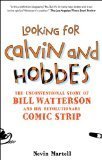
 9. Looking for Calvin and Hobbes: The Unconventional Story of Bill Watterson and his Revolutionary Comic Strip, Nevin Martell
9. Looking for Calvin and Hobbes: The Unconventional Story of Bill Watterson and his Revolutionary Comic Strip, Nevin Martell
Talk about grumpy. This book pictures the author of the strip Calvin and Hobbes as something of a loner, who grated at the publicity his work brought, sometimes to the irritation of his fans and colleagues. But, behind all that, was a comic strip like none other.
I like the book because I like Calvin and Hobbes, but I liked it also because it highlights some important lessons for all of us. Watterson alienated many around him because he refused to turn his strip over to sellable clichés, and to cash in the strip for the plush toy and animated movie market. Whether you think Watterson was right or wrong, he stood with his artistic convictions, and that’s one reason why so many of us love his work.
“Wonderful, lifelike characters are easily corrupted and cheapened by having them appear on every drugstore shelf and rack,” he said. “Several fine strips have turned themselves into shameless advertisements for products.” Moreover, he deplored the continuing of old strips with new authors and boilerplate scripts, just to keep the franchise going. “Strips that had some relevance to the world during the Depression are now being continued by baby boomers, and the results are embarrassing,” he said.
I think there’s some relevance there to evangelical Christianity.
This book also looks at the philosophy behind Watterson’s worldview. The author suggests that the little boy and his tiger in the strip my have been named based on Horace White’s observation that the United States “is based upon the philosophy of Hobbes and the religion of Calvin. It assumes that the natural state of mankind is a state of war, and that the carnal mind is at enmity with God.”
I put this book down several times to find myself in the strips in one of Watterson’s collections. If you like Calvin and Hobbes, or Calvin and Hobbes, you’ll find this book interesting.
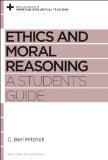
 10. Ethics and Moral Reasoning: A Student’s Guide, C. Ben Mitchell
10. Ethics and Moral Reasoning: A Student’s Guide, C. Ben Mitchell
Ethics books tend to be boring or dated, or both. They’re often boring because they’re abstract, disconnected from the lived-out questions of most people. They’re often dated because they can’t keep up with the whirring nature of technology and culture. This book isn’t boring and it won’t be dated for some time. Mitchell traces why moral philosophy isn’t just for specialists but for the whole Body of Christ. He explains with clarity the various ways of approaching these questions, and offers ethical reflection that isn’t ashamed of the gospel or embarrassed to claim, “The Bible says.” I plan to give this to lots of budding young ethicists, preachers and leaders.
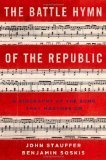
 11. The Battle Hymn of the Republic: A Biography of the Song That Marches On, John Stauffer and Benjamin Soskis
11. The Battle Hymn of the Republic: A Biography of the Song That Marches On, John Stauffer and Benjamin Soskis
I don’t remember ever hearing the Battle Hymn of the Republic sung in the patriotic services at my church growing up. Maybe that’s because it was seen as a “Yankee song,” and the 1980s were too close for south Mississippi to the close of the Civil War. I don’t know, but I remember hearing it first as a child in Elvis Presley’s “American Trilogy,” in which he fused it with “Dixie” and a Bahamian lullaby, seeking to transcend lyrically the Mason-Dixon line. In the years to come, I’ll be struck by the richness of the biblical imagery in the song. But that imagery is controversial, and that’s what this book is about.
Contemporary progressives don’t tend to like hymns with militant imagery (see the controversies over “Onward Christian Soldiers” and “In Christ Alone”), and it’s hard to get more militant than “stomping out the vineyard where the grapes of wrath are stored.” But this book shows that the song was controversial with conservatives, such as J. Gresham Machen who found it to be a Christless, gospel-free anthem of crusading progressivism. Of course, the Battle Hymn returned during the civil rights era, linking the just cause of the Freedom Marchers and others with the earlier abolitionists.
I like the Battle Hymn, and think we should sing it. But this book traced a fascinating series of cultural divides in America, and reminded me how what we sing embeds itself in our hearts, sometimes driving us apart and sometimes bringing us together—and sometimes both in different ages.

 12. The Little Way of Ruthie Leming: A Southern Girl, a Small Town, and the Secret of a Good Life, Rod Dreher
12. The Little Way of Ruthie Leming: A Southern Girl, a Small Town, and the Secret of a Good Life, Rod Dreher
The first time I ever read Rod Dreher, I think in the pages of National Review, I found a kindred spirit. In the years since then, we’ve been in touch often through technology and though we’ve yet to meet in person, I think of him as a friend. Rod sent me this book when it was in early manuscript form, and I was drawn in from start to finish.
This is the story of Rod and his family moving home to St. Francisville, Louisiana, after his sister was stricken with cancer. Part of the appeal is that Dreher is a gut-wrenchingly powerful writer. Part of it is that he doesn’t glaze over returning home. This isn’t Little House on the Bayou. And part of it is that we come from roughly the same part of the world, and I feel every day of sense of loss that I’m not at home in Biloxi.
Wherever you’re from, whether you’re right next door to “Mama and them” or connected only by Skype and memories to your roots, this book will give you much to think about.
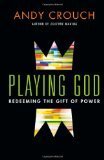 [image error] 13. Playing God: Redeeming the Gift of Power, Andy Crouch
[image error] 13. Playing God: Redeeming the Gift of Power, Andy Crouch
This is another book I read in manuscript form, in order to offer a blurb of endorsement. I planned to read a little at the time, expecting to like it because I’ve loved Andy Crouch’s previous work Culture Making. I read through the whole thing almost in one sitting and found it plowing through my heart, leaving idol shards everywhere.
The book is about how all of us exercise power—regardless of whether we are an unemployed janitor or President of the United States—and how this power will be directed either for or against human flourishing. You will wince at some points as you see how your use of power is more Pharaoh-like than Christlike, or at least I did.








 Related StoriesDuck Dynasty?Rethinking Our Holly-Jolly Christmas SongsCross and the Jukebox: Rascal Flatts – Mayberry
Related StoriesDuck Dynasty?Rethinking Our Holly-Jolly Christmas SongsCross and the Jukebox: Rascal Flatts – Mayberry
December 18, 2013
Duck Dynasty?
Tonight I took to Twitter to say that A&E’s suspension of Duck Dynasty star Phil Robertson is ridiculous. If the reports are true that the reality TV star’s suspension was due to his stated views on homosexuality then I hardly think silencing him can be called open-minded. In fact, it’s the sort of censorious cultural fundamentalism that is neither “progressive” nor “pluralistic.”
Let me stipulate that I’m not really much of a fan of reality television. I think it’s largely inane and not worth watching. But I don’t think that means it ought to be pulled off the air. That’s why there’s an “off” button on the remote control.
Admittedly, A&E didn’t hire Robertson to be Charlie Rose or George Will. They hired him to be comedic and sometimes shockingly homespun. Now, I thought his reported anatomical comparisons were ill-advised and crude. But that doesn’t seem to be where the controversy lies.
The comments that seem most offensive to people are his moral assessments of sex outside of conjugal marriage, which were more or less just a recitation of the Apostle Paul’s words in 1 Corinthians 6. As Christians, we believe that Jesus is lord over sexuality, and he says that sexuality is expressed rightly only in the marriage of a man and a woman. That’s not new. We also think we’re all sinners, and that God calls us all to repentance. That’s not new either.
We’re a divided country on sexual issues. That’s why every news cycle brings more controversy. Why not engage one another, and have the debates in a civil fashion, without attempting to silence one another. I don’t agree with David Letterman’s views on divorce and cohabitation, but I don’t want him suspended for voicing them. I’ll bet I don’t agree with MTV’s Nev Schulman of the popular Catfish show on sexual ethics, but it wouldn’t put me in the fetal position under the table to hear him voice them.
Let’s have the sort of cultural conversation that allows us to seek to persuade each other, not to seek to silence one another with intimidation. That’s what real diversity is all about.
A generation ago, preachy censors wanted the Beatles and Elvis Presley off the air because they were too “subversive” to be heard. We roll our eyes at such now. And that was when there were only three or four television options. Now, I’m not sure I could find Duck Dynasty on television in quicker than ten minutes because A&E is situated among hundreds of cable options. If I don’t like that he’s gutting a deer in front of his granddaughters, I can turn the channel. If I don’t like that he goes to a church with a different view of baptism than mine, then I can go on the Internet and say why I think he’s wrong. And if you don’t like his religious views on sexuality (views held also by Catholics, Eastern Orthodox, and evangelicals as well as by many Orthodox Jews, Muslims, and the Dalai Lama), you’re free to say why you think he’s wrong. And you’re free to change the channel.
Let’s have genuine diversity, meaning let’s talk honestly with one another about what we believe and why. Muting one another isn’t what debate is for in a free society. It’s what remote controls are for.








 Related StoriesRethinking Our Holly-Jolly Christmas SongsCross and the Jukebox: Rascal Flatts – MayberryMoore to the Point Radio: Andy Crouch Discusses Playing God
Related StoriesRethinking Our Holly-Jolly Christmas SongsCross and the Jukebox: Rascal Flatts – MayberryMoore to the Point Radio: Andy Crouch Discusses Playing God
December 13, 2013
The Cross and the Jukebox: Rich Mullins – Hard to Get
“Are you really there? Do you really hear me? How long, Lord, will you allow this to happen?” These are the questions the late Rich Mullins asks in his song, “Hard to Get.” In a tone that sounds almost disrespectful, Mullins seems to be pressing Jesus to prove he has not lost touch with his own humanity.
Join me on this week’s “The Cross and the Jukebox” as we delve into the depths of Mullins’ questioning that God is there, and listening, in the midst of his doubts and despair—and how the gospel offers peace and comfort even in the midst of our deepest anguish.








 Related StoriesCross and the Jukebox: Rascal Flatts – MayberryCross and the Jukebox: You Can’t Make Old FriendsMoore to the Point Radio: Andy Crouch Discusses Playing God
Related StoriesCross and the Jukebox: Rascal Flatts – MayberryCross and the Jukebox: You Can’t Make Old FriendsMoore to the Point Radio: Andy Crouch Discusses Playing God
December 11, 2013
Rethinking Our Holly-Jolly Christmas Songs
Sometimes I learn a lot from conversations I was never intended to hear. This happened once as I was stopping by my local community bookstore. It’s a small, quiet store, so it was impossible not to eavesdrop as I heard a young man tell his friend how much he hated Christmas. And, you know what, the more he talked, the more I understood his point.
This man wasn’t talking about the hustle and bustle of the holidays, or about the stresses of family meals or all the things people tend to complain about. What he hated was the music.
This guy started by lampooning Sting’s Christmas album, and I found myself smiling as I browsed because he is so right; it’s awful. But then he went on to say that he hated Christmas music across the board. That’s when I started to feel as though I might be in the presence of the Grinch. You know, when every Who down in Who-ville, the tall and the small, would stand close together, with Christmas bells ringing; they’d stand hand-in-hand. And the Who’s would start singing. The sour old green villain didn’t like that.
But then this man explained why he found the music so bad. It wasn’t just that it was cloying. It’s that it was boring.
“Christmas is boring because there’s no narrative tension,” he said. “It’s like reading a book with no conflict.”
Now he had my attention.
I’m sure this man had thought this for a long time, but maybe he felt freer to say it because we were only hours out from hearing the horrifying news of a massacre of innocent children in Connecticut. For him, the tranquil lyrics of our Christmas songs couldn’t encompass such terror. Maybe we should think about that.
Of course, some of the blame is on our sentimentalized Christmas of the American civil religion. Simeon the prophet never wished anyone a “holly-jolly Christmas” or envisioned anything about chestnuts roasting on an open fire. But there’s our songs too, the songs of the church. We ought to make sure that what we sing measures up with the, as this fellow would put it, “narrative tension” of the Christmas story.
The first Christmas carol, after all, was a war hymn. Mary of Nazareth sings of God’s defeat of his enemies, about how in Christ he had demonstrated his power and “has brought down the mighty from their thrones and exalted those of humble estate” (Lk. 1:52). There are some villains in mind there.
Simeon’s song, likewise, speaks of the “fall and rising of many in Israel” and of a sword that would pierce the heart of Mary herself. Even the “light of the Gentiles” he speaks about is in the context of warfare. After all, the light, the Bible tells us, overcomes the darkness (Jn. 1:5), and frees us from the grip of the devil (2 Cor. 4).
In a time of obvious tragedy, the unbearable lightness of Christmas seems absurd to the watching world. But, even in the best of times, we all know that we live in a groaning universe, a world of divorce courts and cancer cells and concentration camps. Just as we sing with joy about the coming of the Promised One, we ought also to sing with groaning that he is not back yet (Rom. 8:23), sometimes with groanings too deep for lyrics.
The man in the bookstore knew that reality is complicated. There’s grit, and there’s tension. Without it, Christmas didn’t seem real to life. It’s hard to get more tense than being born under a king’s death sentence (Matt. 2:16), and with an ancient dragon crouching at the birth canal to devour you (Rev. 12:4). But this man didn’t hear any of that in Christmas. I’m glad I overheard him.
We have a rich and complicated and often appropriately dark Christmas hymnody. We can sing of blessings flowing “far as the curse is found,” of the one who came to “free us all from Satan’s power.”
Let’s sing that, every now and then, where we can be overheard.
A version of this article originally ran on December 18, 2012.








 Related StoriesCross and the Jukebox: Rascal Flatts – MayberryMoore to the Point Radio: Andy Crouch Discusses Playing GodMoore to the Point – Supreme Court To Hear Hobby Lobby Case, Russell Moore Reacts
Related StoriesCross and the Jukebox: Rascal Flatts – MayberryMoore to the Point Radio: Andy Crouch Discusses Playing GodMoore to the Point – Supreme Court To Hear Hobby Lobby Case, Russell Moore Reacts
December 6, 2013
Cross and the Jukebox: Rascal Flatts – Mayberry
“Memory is hunger,” Ernest Hemingway once said, and I think he’s right. In every era, we battle the pull of nostalgia. We tend to overlook the grace and glory of the present, and ignore the brutality and banality of the past. It’s easy to imagine that we’d all be better off if we could just get back to the perceived “good ole days” of our our pasts.
This week on “The Cross and the Jukebox” we’ll examine this tendency as we think through the Rascal Flatts’ song “Mayberry,” and ask why it is that people tend to long for a perceived golden era. As we do, we’ll consider the way the gospel shows us that we’re made for nostalgia, but nostalgia of a different kind—not for an idealized past, but instead for a future, for a kingdom, for life eternal in a world made right.








 Related StoriesCross and the Jukebox: You Can’t Make Old FriendsThe Cross and the Jukebox: Rich Mullins – Hard to GetMoore to the Point Radio: Andy Crouch Discusses Playing God
Related StoriesCross and the Jukebox: You Can’t Make Old FriendsThe Cross and the Jukebox: Rich Mullins – Hard to GetMoore to the Point Radio: Andy Crouch Discusses Playing God
December 4, 2013
Moore to the Point Radio: Andy Crouch Discusses Playing God
Andy Crouch, one of Christianity’s most compelling visionaries on culture, joined Russell D. Moore to talk about his book, Playing God: Redeeming the Gift of Power.
This book plowed through my heart, leaving idol shards everywhere in its path. It will cause you to rethink your assumptions and perhaps to reset your priorities.








 Related StoriesCross and the Jukebox: Rascal Flatts – MayberryMoore to the Point – Supreme Court To Hear Hobby Lobby Case, Russell Moore ReactsCross and the Jukebox: You Can’t Make Old Friends
Related StoriesCross and the Jukebox: Rascal Flatts – MayberryMoore to the Point – Supreme Court To Hear Hobby Lobby Case, Russell Moore ReactsCross and the Jukebox: You Can’t Make Old Friends
November 26, 2013
Moore to the Point – Supreme Court To Hear Hobby Lobby Case, Russell Moore Reacts
Listen as Russell Moore shares his thoughts on the Supreme Court’s decision to hear the Hobby Lobby Case, regarding the HHS Mandate.








 Related StoriesCross and the Jukebox: Rascal Flatts – MayberryMoore to the Point Radio: Andy Crouch Discusses Playing GodCross and the Jukebox: You Can’t Make Old Friends
Related StoriesCross and the Jukebox: Rascal Flatts – MayberryMoore to the Point Radio: Andy Crouch Discusses Playing GodCross and the Jukebox: You Can’t Make Old Friends
How to Deal with Holiday Family Tensions
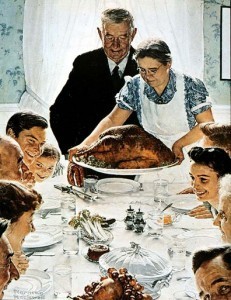 We tend to idealize holidays, but human depravity doesn’t go into hibernation between Thanksgiving and New Year’s. One thing that will hit most Christians, sooner or later, are tensions within extended families at holiday time. Some of you will be visiting family members who are contemptuous of the Christian faith and downright hostile to the whole thing.
We tend to idealize holidays, but human depravity doesn’t go into hibernation between Thanksgiving and New Year’s. One thing that will hit most Christians, sooner or later, are tensions within extended families at holiday time. Some of you will be visiting family members who are contemptuous of the Christian faith and downright hostile to the whole thing.
Others are empty nest couples who now have sons- or daughters-in-law to get adjusted to, maybe even grandchildren who are being reared, well, not exactly the way the grandparents would do it. Still others are young couples who are figuring out how to keep from offending family members who are watching the calendar, to see which side of the family gets more time on the ledger. And others are new parents, trying to figure out how to parent their child when it’s Mammonpalooza at Aunt Judie’s house this year.
And, of course, there’s just always the kind of thing that happens when sinful people come into contact with one another. Somebody asks “When is the baby due?” to an unpregnant woman or somebody blasts your favorite political figure or…well, you know.
Here are a few quick thoughts on what followers of Jesus ought to remember, especially if you’ve got a difficult extended family situation.
1.) Peace. Yes, Jesus tells us that his gospel brings a sword of division, and that sometimes this splits up families (Matt. 10:34-37). But there’s a difference between gospel division and carnal division (see 1 Cor. 1, e.g.). The Spirit brings peace (Gal. 5:22), and the sons of God are peacemakers (Matt. 5:9). Since that’s so, we ought to “strive for peace with everyone” (Heb. 12:14).
Often, the divisiveness that happens at extended family dinner tables is not because an unbelieving family member decides to persecute a Christian. It’s instead because a Christian decides to go ahead and sort the wheat from the weeds right now, rather than waiting for Judgment Day (Matt. 13:29-30). Yes, the gospel exposes sin, but the gospel does so strategically, in order to point to Christ. Antagonizing unbelievers at a family dinner table because they think or feel like unbelievers isn’t the way of Christ.
Some Christians think their belligerence is actually a sign of holiness. They leave the Christmas table saying, “See, if you’re not being opposed, then you’re not with Christ!” Sometimes, of course, divisions must come. But think of the qualifications Jesus gives for his church’s pastors. They must not be “quarrelsome” and they must be “well thought of by outsiders” (1 Tim. 3:3,7). That’s in the same list as not being a heretic or a drunk.
Your presence should be one of peace and tranquility. The gospel you believe ought to be what disrupts. There’s a big difference.
2.) Honor. The Scripture tells us to fear God, to obey the king, and to honor (notice this) everyone (1 Pet. 2:17). If your parents are high-priests in the Church of Satan, they are still your parents. If cousin Betty V. does Jello shots in her car, just to take the edge off the cocaine, well, she still bears the imprint of the God you adore.
You cannot do the will of God by opposing the will of God. That is, you can’t evangelize by dishonoring father and mother, or by disrespecting the image-bearers of God. Pray for God to show you the ways those in your life are worthy of honor, and teach your children to follow you in showing respect and gratitude.
3.) Humility. Part of the reason some Christians have such difficulty with unbelieving or nominally believing extended family members is right at this point. They see differences over Jesus as being of the same kind (just of a different degree) as our differences over, say, the war in Afghanistan or the future of Sarah Palin or the Saints’ winning streak this year.
Often the frustration comes not because of how much Christians love their family members as much as how much these Christians want to be right. The professional Left and Right cable-TV and talk-radio pontificators may value the last word, but we can’t.
Jesus never, not once, seeks to prove he is right, and he was accused of being everything from a wino to a demoniac. He rejects Satan’s temptation to force a visible vindication, waiting instead for God to vindicate him at the empty tomb.
Often Christians veer toward Satanism at holiday time because we, deep down, pride ourselves on knowing the truth of the gospel. The rage you feel when Uncle Happy says why “many roads lead to God” might be more about the fact that you want to be right than that you want him to be resurrected.
Plus, we often forget just how it is that we came to be in Christ in the first place. This wasn’t some act of brilliance, like being accepted into Harvard or some exertion of the will, like learning to put a Rubik’s cube together in 20 seconds. “What do you have that you did not receive,” the Apostle Paul asks us, “And if you received it, then why do you boast as though you didn’t receive it?” (1 Cor. 4:6-7)
Satan wants to destroy you through his primal flaw, pride (1 Pet. 5:7-9; 1 Tim. 3:6). He doesn’t care if that pride comes through looking around the family table and figuring out how much more money you make than your second cousin-in-law or whether it comes by your looking around the table and saying, “Thank you Lord that I am not like these publicans.” The end result is the same (Prov. 29:23).
Unless you’re in an exceptionally sanctified family, you’re going to see failing marriages, parenting crises, and a thousand other shards of the curse. If your response is to puff up as you look at your own situation, there’s a Satanist at your family gathering, and you’re it.
4.) Maturity. The Scripture tells us that if we follow Jesus we’ll follow the path he took: that’s through temptation, to suffering, and ultimately to glory. Often we think these testings are big, monumental things, but they rarely are.
God will allow you to be tested. He’ll refine you, bring you to the fullness of maturity in Christ. He probably won’t do it by your fighting lions before the emperor or standing with a John 3:16 sign before a tank in the streets of Beijing. More likely, it will be through those seemingly little places of temptation—like whether you’ll love the belching brother-in-law at the other end of the table who wants to talk about how the Cubans killed JFK and how to make $100,000 a year selling herbal laxatives on the Internet.
Some of the tensions Christians face at holiday time have nothing to do with outside oppression as much as internal immaturity on the part of the Christians themselves.
I’ve had young men who tell me they feel treated like children when they go home to see their extended families. Their parents or parents-in-law are dictating to them where to go, when, and for how much time. Their parents or parent-in-law are hijacking the rearing of their children (”Oh, come on! He can watch Die Harder! Don’t be so strict!”). Some of these men just give in, and then seethe in frustration.
Sometimes that’s because the extended family is particularly obstinate. But sometimes the extended family treats the young man like a child because that’s how he acts the rest of the year. Don’t live financially and emotionally dependent on your parents or in-laws, passively dithering in your decisions about your family’s future, and then expect them to see you as the head of your house.
Be a man (if you are one). Make decisions (including decisions about where, and for how long, you’ll spend the holidays). Teach and discipline your children.Your extended family might not like it at first, but they’ll come to respect the fact that you’re leaving and cleaving, taking responsibility for that which has been entrusted to you.
5.) Perspective. Remember that you’ll give an account at the resurrection for every idle (that means seemingly tiny, insignificant, unmemorable) thought, word, and deed. At the Judgment Seat of the Lord Christ, you’ll be responsible for living out the gospel in every arena to which the Spirit has led you… including Aunt Flossie’s dining room table.
A version of this article originally ran on November 21, 2011.









Comments[...] the holiday season and all is peaceful and bright. Or ... by Gems in the Web 12/14/12By: Keeping Christ in Christmas Part 1: Holiday Boycotts « The Beginning of the End by Keeping Christ in Christmas Part 1: Holiday Boycotts « The Beginning of the EndDr. Moore, thank you for this timely message and reminder. ... by James FieldsBy: Linkage: 12.01.12 | Kevin P. Larson by Linkage: 12.01.12 | Kevin P. LarsonBy: Friday’s 5 to Live By—The Holiday Edition | Biblical Counseling Coalition Blogs by Friday’s 5 to Live By—The Holiday Edition | Biblical Counseling Coalition BlogsPlus 15 more...Related StoriesRethinking Our Holly-Jolly Christmas SongsCross and the Jukebox: Rascal Flatts – MayberryMoore to the Point Radio: Andy Crouch Discusses Playing God
November 22, 2013
Cross and the Jukebox: You Can’t Make Old Friends
We live in an age where, increasingly, being someone’s friend is little more than exchanging information on a computer screen, or entails little more than the casual nod of a head when passing in the hall. When Jesus calls us “friends” (John 15:15), though, surely he means something more than what we often do.
This week on “The Cross and the Jukebox,” we’ll consider the song that upholds the meaningfulness of genuine, time-tested friendship, “You Can’t Make Old Friends” by Kenny Rogers and Dolly Parton. Join us, then, as we listen to this song, and as we consider how friendship is both a gift from God and a reminder for those of us in Christ that it points ahead to the age to come—where will be reunited with loved ones and united together in friendship and life for eternity.








 Related StoriesCross and the Jukebox: Rascal Flatts – MayberryThe Cross and the Jukebox: Rich Mullins – Hard to GetMoore to the Point Radio: Andy Crouch Discusses Playing God
Related StoriesCross and the Jukebox: Rascal Flatts – MayberryThe Cross and the Jukebox: Rich Mullins – Hard to GetMoore to the Point Radio: Andy Crouch Discusses Playing God
November 18, 2013
Why It's Hard to Forgive
The most difficult math problem in the universe, it turns out, is 70 x 7. Perhaps the hardest thing to do in the Christian life is to forgive someone who has hurt you, often badly. But Jesus says the alternative to forgiving one’s enemies is hell.
One of the reasons this is hard for us is because we too often assume forgiving a trespasser means allowing an injustice to stand. This attitude betrays a defective eschatology. At our Lord’s arrest (Matt. 26:47-54), Jesus told Peter to put his sword back into his sheath not because Jesus didn’t believe in punishing evildoers (think Armageddon). Jesus told Peter he could have an armada of angelic warriors at his side (and one day he will). But judgment was not yet, and Peter wasn’t judge.
That’s the point.
When we forgive, we are confessing that vengeance is God’s (Rom. 12:19). We don’t need to exact justice from a fellow believer because justice has already fallen at the cross. We don’t need to exact vengeance from an unbeliever because we know the sin against us will be judged in hell or, more hopefully, when the offender unites himself to the One who is “the propitiation for our sins, and not for ours only but also for the sins of the whole world” (1 Jn. 2:2).
A prisoner of war who forgives his captor or a terminated pastor who forgives a predatory congregation, these people are not overlooking sin. Nor are they saying that what happened is “okay” or that the relationships involved are back to “normal” (whatever that is). Instead they are confessing that judgment is coming and they can trust the One who will be seated on that throne.
You don’t have to store up bitterness, and you don’t have to find ways of retaliation for what’s been done to you. You can trust a God who is just. If you won’t forgive, if you refuse to rest in God’s judgment without seeking to retaliate, it doesn’t matter what your evangelistic tracts and prophecy charts say. When it comes to the gospel and the to the end times, you’re just another liberal.
A version of this article originally ran on November 17, 2011.









CommentsYou were doing so well, then you fumbled the close with your ... by John CarothersBy: Why Its Hard to Forgive « RCCS Devotional Blog by Why Its Hard to Forgive « RCCS Devotional BlogBy: Help on forgiveness from Russell Moore | JohnGrunditz by Help on forgiveness from Russell Moore | JohnGrunditzRelated StoriesCulture of Adoption VideoYour Ministry, Did You Build That?Forum: The Pastor and Politics
Russell D. Moore's Blog
- Russell D. Moore's profile
- 340 followers



